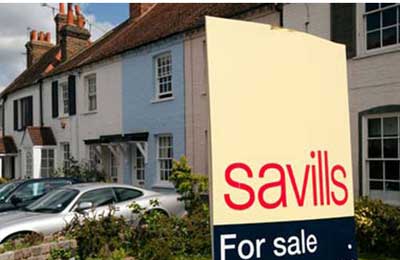
UK's stable property market 'attracts Mideast buyers'
LONDON, August 20, 2018
The UK property lending market is largely stable as a result of pressure on interest cover ratios (ICRs) and debt yields despite the Bank of England’s recent decision to raise interest rates, from 0.5 per cent to 0.75 per cent, for only the second time in a decade, according to international real estate advisor Savills.
This lending market stability is leading to some lenders offering lower leverage to borrowers when they refinance, ultimately creating opportunities for Middle East investors, stated Savills in its 30th annual Financing Property presentation.
Commenting on the topic, Murray Strang, the head of Dubai at Cluttons Middle East (recently acquired by Savills), said: "Regardless of the single recent rise in interest rates, financing rates and conditions are more competitive in the UK now than ever before, creating opportunities for Middle East investors to renegotiate terms of their current facilities or look to switch lenders with a range of ‘challenger banks’ offering competitive terms and rates."
"While unlikely, the only danger on the flipside of this is further rising interest rates, over the next six months to a year, which may create an element of caution in refinancing," he noted.
Savills cited the research from the Cass Lending Survey, which it sponsors, and noted that 73 per cent of all outstanding debt is due for repayment in the next five years, with loan maturities set to peak in 2020 due to the large volume of loans drawn in 2015.
This could cause some borrowers to seek alternative sources of finance, especially if values soften in the interim. With yields already low it will be challenging to replicate existing levels of leverage if sustainable ICRs are to be maintained. This will inevitably lead to lower loan to values (LTVs) which could prompt some stress at the point of refinancing, said the industry expert.
According to Savills, while many banks either can’t or won’t increase LTVs due to regulatory restrictions and prudence, ‘alternative lenders’ could be attracted to such borrowers as they look to offer increased leverage at higher margins, although much will depend on the track record of the borrower, it stated.
The next three to four years could therefore offer tremendous opportunities for alternative lenders and will further hasten the move of property debt from traditional banks to the alternative sector where Savills has identified approximately 100 lenders.
In 2008, Savills said that the alternative sector accounted for 5 per cent of lending - by 2017 this had increased to 25 per cent, and this is deemed a conservative estimate.
In their theme ‘Should lenders and investors be worried about the rising cost of money?’, Savills pointed out that the underlying cost of money had increased over the past year in expectation of the rise in the BoE Base Rate: the five-year Swap rate has climbed from 0.8 per cent in May 2017 to approximately 1.3 per cent – a rise of over 60 per cent in a 12 month period – and three month Libor is also significantly up; it remains to be seen quite how much the recent interest rate rise could affect matters, however this could exert pressure on values.
Ian Malden, the head of valuation at Savills, said: "Compared to a decade ago, on the whole the lending industry appears to be in a good place. Regulation, prudence and a healthy market have generated low LTVs and high ICRs and a diversified lending market has reduced the prospects of ‘contagion’."
"There is no room for complacency, but given the level of equity in the market, it’s less likely that a borrower will need to hand over the keys to the lender if values were to fall," stated Malden.
Nick Hume, the director in the valuations team at Savills, said: "The rising cost of money won’t necessarily cause notable value shifts or worry the lending industry so long as the overall cost of finance remains relatively low, as is currently anticipated."
"However, in the face of pressure on ICRs and debt yields, it could lead some lenders to offer lower leverage, which could benefit alternative lenders who are prepared to go higher up the risk curve to generate better returns. This is particularly relevant to refinancing, as a gentle decline in values will create pockets of stress, as is already visible in certain areas of the retail sector," he added.
Mat Oakley, head of commercial research at Savills, pointed out that the challenge for investors would be finding asset classes that would deliver rental growth over the next five years.
"We expect logistics property to remain the star performer, averaging 3 per cent every year, but rents have also grown by 3.5 per cent in the city so far this year and we anticipate a similar upward trend to be mirrored in the undersupplied major regional markets," noted Oakley.
"While the news around retail remains downbeat, we do expect to see some upward rental growth over the next five years in strong locations that are a good fit to their catchment areas," he added.
Commenting on what this means for Middle East investors, Strang said: "When analysing trends of GCC funded investment into UK commercial property, we have seen considerable growth in demand within the last 3-5 years."
"Along with challenging oil prices and currency fluctuation, this is due to the significant emergence of regional cities outside of London providing attractive capital growth and solid rates of return to investors, and we expect this trend to continue," he added.-TradeArabia News Service








